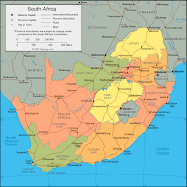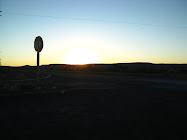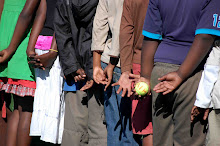
Castrol South Africa, major oil producer, makes a major donation to GRS to be distributed in four sites throughout South Africa. Result in terms of my world: a five day, soccer-centric, HIV-educating, dusty dirt field, hot, arid, exhausting extravaganza, all packed into the weeklong holiday children get off from school.
The five-person team here in Kimberley split up to support two camps at separate venues, each hosting over 100 excited kids. The camps were intended to run from 10:30 to 2:30. In reality, we arrived to set up around 8am, only to find the majority of the participants already waiting for us, ready and running. Every day, without fail, we watched our intended departure time slip further and further away as our schedule fell victim to a variety of obstacles, including but not limited to: the intrusion of a herd of migrating cows on our soccer pitches, the intrusion of a herd of migrating goats on our soccer pitches, the lag time in our efforts to coordinate games and activities for over 100 kids and 13 coaches, mild to somewhat-not-so-mild dust storms, and the constant heckling/confusion/distraction generously offered by a gang of friendly yet sassy kids who stopped by to take in the scene.
Each day the participants and coaches alternated between two Grassroot Soccer educational sessions and two soccer matches, specifically focused on the values of fair play. Before each game the teams discussed and decided upon three “fair play rules” which, if followed throughout the match, could garner additional points. The most popular rules prohibited insults, required both teams to celebrate every goal scored, and stipulated that when players fell, opponents had to help them up. The execution of said rules was generally varied, ranging from unfortunate and blatant disregard to genuine and uplifting adherence.

On the final day we brought in a voluntary counseling and testing partner organization, New Start, to offer players of legal age (14+) and coaches the opportunity to be tested for HIV. Four representatives from the organization came to our site. They worked out of two tents set up a few yards away from our fields, providing pre and post-counseling along with the test itself. The entire process takes under an hour.
The testing component of the camp was easily the most charged event of the week. Every individual that tested, or even considered testing, surely experienced a sense of fear and anxiety that I struggle to describe, much less truly understand. In speaking with our coaches—the individuals who dedicate hours and hours of their time per week to educate about HIV—and hearing even their concerns about testing, I began to more fully realize the intense and complex implications that accompany the testing process. While some coaches decided that they weren’t ready to take that step, many others decided differently.
Zweli, an unusually tall, lanky, and loud coach from Danielskuil, recounted his testing experience to me as I drove a group of coaches home after the camp. He explained that, knowing of the VCT opportunity at the end of the camp, he’d struggled between the temptation and the fear to know his status throughout the entire week. When he encouraged his team to test, they responded with a challenge—a challenge for their coach to test along with them. Armed with this motivation, Zweli attended pre-counseling with every member of his team who tested. He waited for and spoke with every player after they received their results, and finally, he followed through on his promise.
As we drove through the vast, flat landscape back to Danielskuil, Zweli brought me along for the ride of his emotional roller coaster. He concluded his story by explaining that it was the courage of his players that finally convinced him to learn his status. He told me that he was proud of them, not only for their own courage, but also for the courage that they instilled within him. Zweli is a remarkable coach. He’s energetic, enthusiastic and fully engaged. But at that moment, when attention shifted away from Zweli and instead towards his team, I’d never been more impressed by him.
Thankfully, every member of Zweli’s team who tested was HIV negative. But in a country where, statistically speaking, 20 of our 100 participants should be HIV positive, Zweli’s team was most likely an exception. Out of the 28 individuals who were tested at our camps, one tested positive. He is 15 years old.
Testing results remain entirely confidential. If people test positive they immediately receive post-test counseling and are referred to a local clinic equipped to provide further care, including anti-retroviral treatment. Unfortunately, consistency is essential for the effectiveness of treatment, and this consistency is rarely realized. It’s a surreal experience to suddenly know, with certainty, that one of the kids that attended our camp all week is HIV positive. It’s nearly impossible to fathom his experience: to learn within minutes, from a complete stranger, in only a light fabric tent raised above the dirt ground, that he will live the rest of his life with knowledge of his positive status. I’m afraid for him. I’m overwhelmed by the hugely daunting challenges I imagine his future will hold. He is 15 years old.















No comments:
Post a Comment